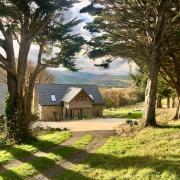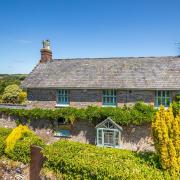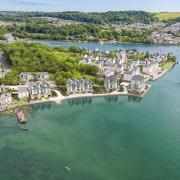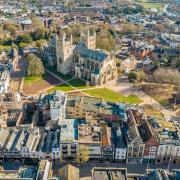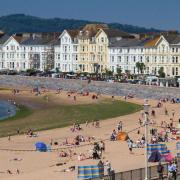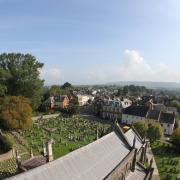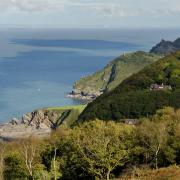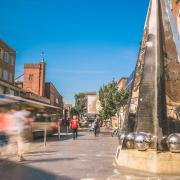Philip Dalling, who lives on Exmoor, brings news and features from the National Park to Devon Life readers every month

It is a grey, hazy winter morning on the Exmoor coast, with just a hint of possible later sunshine. Edward Nightingale, established in his native North Devon after two decades sailing the world’s oceans, is tracking vessels moving along the shipping lanes of the Bristol Channel.
He makes a careful note too of the ships tied up in the ports along the South Wales coast, which is just visible through the morning haze. He knows from where they originally set sail, what cargoes they carried, and where they are bound once they leave West Country waters.
It is a routine Edward follows every morning of his life, and one well known to Exmoor residents and thousands of summer visitors who studied the photographs and shipping records he posted in the windows of Lynmouth’s Memorial Hall, and described vividly in the columns of a local newsletter.
The people who enjoyed his descriptions of the oil tankers, car transporters, bulk carriers, dredgers and the few surviving general cargo vessels which still ply the unpredictable waters of the Severn Sea, could be excused for having a mental portrait of Edward gazing out with a telescope from his Lynton eyrie, hundreds of feet above the breakers.
They must think again. For although looking out onto the waters of the Channel and across to the imposing bulk of Foreland Point certainly dictated the choice of home for Edward and his sister Jane, his ability to see the exact whereabouts of vessels at sea, and the opportunity to peer into the harbours of Swansea, Cardiff, Barry and Newport, owes nothing at all to the naked eye or a powerful lens.
Edward’s all-seeing eye is a computer screen, and in particular a powerful programme called AIS (Automatic Identification System), which allows him to monitor shipping in any part of the world, at any given time. The system, which Edward uses to pursue his absorbing interest, is a state-of-the-art commercial tool, an integral part of the daily activity of all the major shipping lines.
“Quite simply, it is a huge part of my life, especially since I became less mobile,” Edward explains.
The son of a Lynton GP, educated at Exeter School, he spent a large part of his youth on the Exmoor coast but had little interest in the sea and ships until it came time to choose a way to earn a living.
“Joining the Merchant Navy was an accident really. I suppose I must have read something in a book in the school library and this pointed me towards a four-year apprenticeship with what in 1956 was still called the British Tanker Company, but would later become BP.
“At that time the company had a hundred tankers. The British merchant marine was flourishing and there were plenty of opportunities for apprentices, who could reasonably expect to enjoy long and successful careers at sea.”
Edward gained his second mate’s ticket at the conclusion of his apprenticeship and then joined Port Line, sailing on a regular basis to Australia and New Zealand, carrying general cargo out and freezer cargo home. Voyages to New Zealand were via the Panama Canal, whilst Australia was reached through the Suez Canal or, when the canal was blocked, around the Cape. A round trip could take up to five months.
Edward thoroughly enjoyed the life at sea, and gained his mate’s and master’s tickets. Sadly, there was a shadow on the horizon for seafarers. This took the form of the arrival of the giant container vessels that would drive so many of the general cargo ships from the oceans.
“The 1950s and 1960s were halcyon days for British merchant shipping,” Edward explained. “When the container ships arrived, everything changed. They were able to carry as much as five or even ten times the amount of cargo as the smaller vessels, with much smaller crews – and they needed to spend far, less time, with modern technology, discharging in port.
“By the mid-1970s, although I was by now a chief officer, I and many others could see that promotion to one of the rare commands now available was increasingly unlikely, so I reluctantly returned to the shore.”
Edward stayed involved with shipping for a year, as an assistant marine superintendent with the Cunard Line, based in London. “It was a very worthwhile year. I was still involved with shipping, but had the chance to see and do things that had been impossible whilst I was at sea, and are harder to do anyway when you live in a remote place like Exmoor.”
Today, although the Bristol Channel is less busy with shipping than it was 30 years ago, it is still a significant waterway.
“Living on the Exmoor cliffs, I keep a watch on everything that moves, with shipments of steel, fertiliser, aggregates, grain (animal feed) and yes, even some general cargo, moving beyond my windows. Even without the shipping, the sea and the coastline never fails to fascinate. The appearance of the Foreland is continually changing, due to the effects of the sun, the rain, the mist and other natural factors. For me at least, the lure of the Bristol Channel and the sea as a whole will certainly never diminish.”
This article was first published in the March issue of Devon Life. To get the magazine delivered every month to your home, subscribe at www.subscriptionsave.co.uk/dev or call 08448484217



